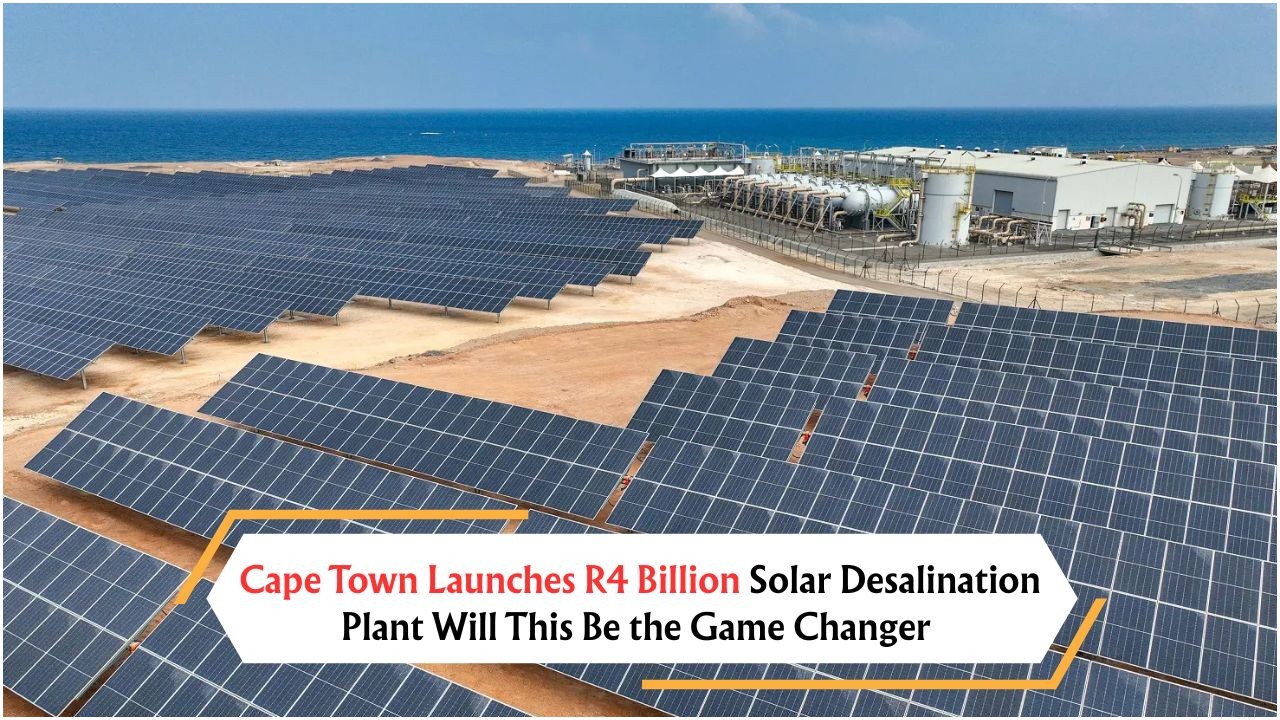Cape Town’s solar desalination initiative: Cape Town is set to address its ongoing water scarcity issues with a groundbreaking development — a 60MW solar desalination plant. This project, recently approved, promises to provide a sustainable and renewable solution to the city’s water crisis. The integration of solar energy into desalination processes not only reduces reliance on traditional power sources but also aligns with South Africa’s broader environmental goals. As Cape Town continues to grapple with the effects of climate change, this innovative approach highlights the city’s commitment to securing a reliable water supply for its residents while minimizing environmental impact.
Exploring the Solar Desalination Plant in Cape Town
The newly approved solar desalination plant in Cape Town represents a significant step forward in the city’s efforts to combat drought. By harnessing solar power, the plant will convert seawater into potable water, providing a vital resource for the city’s population. The project is expected to produce approximately 150 million liters of water daily, significantly alleviating the pressure on existing water resources. Furthermore, the plant’s reliance on renewable energy will reduce carbon emissions associated with traditional desalination methods.
- Integration with existing infrastructure
- Reduction of carbon footprint
- Long-term sustainability
- Cost-effectiveness
- Enhancement of water security
Benefits of Solar-Powered Desalination in Cape Town
Solar-powered desalination plants offer numerous advantages over conventional systems. Firstly, they provide a sustainable water supply without the environmental drawbacks of fossil fuel-based energy. This aligns with South Africa’s commitment to reducing greenhouse gas emissions and promoting clean energy sources. Secondly, solar desalination reduces operational costs, as solar energy is abundant and incurs no fuel expenses. This cost-effectiveness translates into lower water prices for consumers, making it an economically viable solution for Cape Town’s water challenges.
| Aspect | Traditional Desalination | Solar Desalination |
|---|---|---|
| Energy Source | Fossil Fuels | Solar Power |
| Carbon Emissions | High | Low |
| Operational Costs | Higher | Lower |
| Water Production | Variable | Consistent |
| Environmental Impact | Significant | Minimal |
Key Features of Cape Town’s Desalination Project
The Cape Town desalination initiative includes several key features that distinguish it from previous efforts. Firstly, the plant will be strategically located to optimize the use of solar energy, ensuring maximum efficiency. Additionally, the project incorporates state-of-the-art desalination technology, enhancing water purification processes and ensuring the highest quality of potable water. The inclusion of advanced monitoring systems will allow for real-time tracking of water production and environmental impact, ensuring transparency and accountability.
- Strategic location
- Advanced desalination technology
- Real-time monitoring
- High-quality potable water
- Transparent operations
Economic and Environmental Impacts of the Desalination Plant
The economic and environmental impacts of the solar desalination plant are profound. Economically, the project will create numerous jobs during its construction and operational phases, contributing to local economic growth. Environmentally, the plant’s reliance on renewable energy will significantly reduce Cape Town’s carbon footprint, setting a precedent for other South African cities to follow. Furthermore, the plant’s ability to consistently produce clean water will enhance the city’s resilience against future droughts, ensuring long-term water security for residents.
| Impact | Economic |
|---|---|
| Job Creation | High |
| Local Economy Boost | Significant |
| Carbon Footprint Reduction | Substantial |
| Water Security | Improved |
Challenges and Solutions in Implementing Solar Desalination
While the benefits of the solar desalination plant are clear, several challenges must be addressed to ensure successful implementation. These include the high initial costs of construction, potential environmental impacts during the building phase, and the need for ongoing maintenance and monitoring of the facility. To overcome these challenges, the city plans to employ innovative financing strategies, engage with environmental experts to minimize impacts, and establish robust maintenance protocols to ensure the plant operates efficiently over the long term.
- High initial costs
- Potential environmental impacts
- Ongoing maintenance requirements
- Innovative financing strategies
- Robust maintenance protocols
Future Prospects of Solar Desalination in South Africa
The successful implementation of Cape Town’s solar desalination plant could pave the way for similar projects across South Africa. As the country continues to face water scarcity challenges, solar desalination offers a sustainable and scalable solution. Future prospects include the potential for expanding solar desalination technology to other coastal cities, fostering regional cooperation on renewable energy projects, and contributing to South Africa’s broader environmental and economic goals. The experience gained from this project will be invaluable in guiding future initiatives and ensuring the country’s water security.
- Expansion to other coastal cities
- Regional cooperation
- Contribution to environmental goals
- Guidance for future initiatives
FAQs on Cape Town’s Solar Desalination Plant
Below are some frequently asked questions about the solar desalination plant project:
- What is the expected output of the plant? The plant is projected to produce about 150 million liters of potable water daily.
- How does solar desalination work? The process uses solar energy to power the desalination of seawater, making it suitable for consumption.
- What are the environmental benefits? The plant significantly reduces carbon emissions and reliance on fossil fuels.
- Will this affect water prices? The reliance on solar energy is expected to lower operational costs, potentially reducing water prices.
| FAQ | Answer |
|---|---|
| Expected Output | 150 million liters daily |
| Process | Solar energy-powered desalination |
| Environmental Benefits | Reduced carbon emissions |
| Water Prices | Potential reduction |
Conclusion and Future Outlook
Cape Town’s solar desalination plant marks a pivotal shift towards sustainable water management in South Africa.
Additional Information
For more insights on solar desalination technology and its benefits, stay tuned to our updates.
Explore how Cape Town is leading the way in sustainable water solutions.
Learn more about the project’s impact on local communities and economies.
Discover the potential for solar desalination in other South African cities.
Stay informed about environmental advancements in desalination technology.
Connect with experts and stakeholders involved in this innovative project.
Understand the challenges and solutions in implementing large-scale desalination projects.
Gain insights into the future of water security in South Africa.










